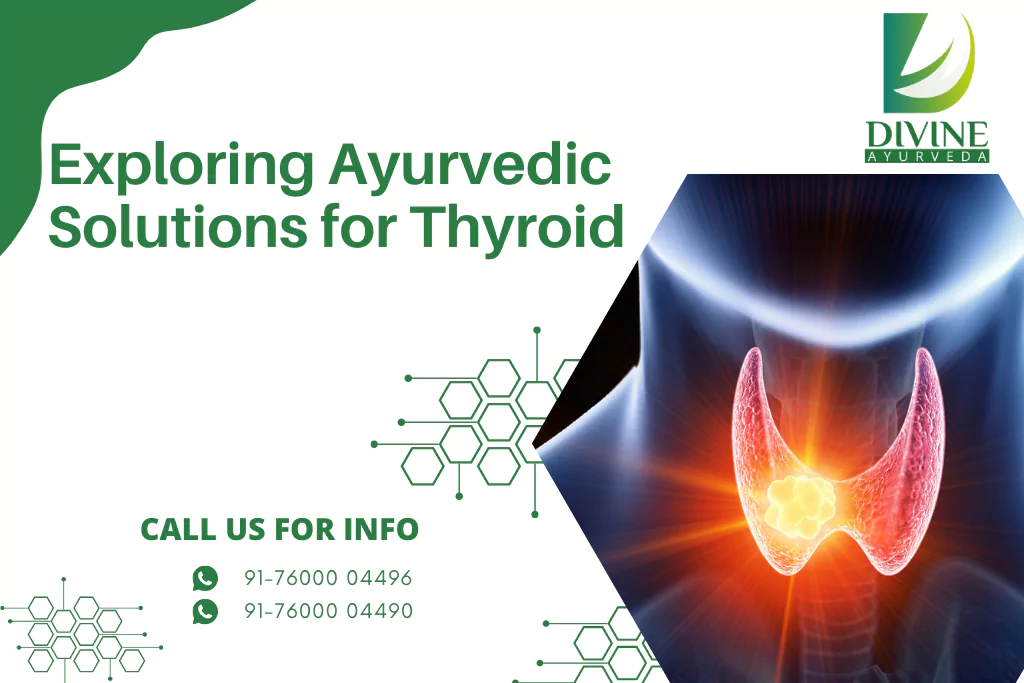Thyroid issues impact around 1/10 persons worldwide, with up to 60% remaining untreated. Women are more likely than men to develop thyroid disorders, with an 8:1 female to male ratio. Now let’s understand Thyroid deeply.
What is the Thyroid?
The thyroid gland is tiny and butterfly-shaped, positioned in the front of the neck directly below Adam’s apple.
What is the function of Thyroid ?
The tiny size, thyroid gland regulates several body activities through the synthesis of hormones. These hormones, especially thyroxine (T4) and triiodothyronine (T3), affect metabolism, growth and development, body temperature, heart rate, and energy level.
The pituitary gland regulates thyroid function by releasing thyroid-stimulating hormone (TSH), which signals the thyroid gland to generate thyroid hormones. If the thyroid produces excessive or insufficient of these hormones, thyroid diseases such as hypothyroidism (underactive thyroid) or (overactive thyroid) can develop, causing a variety of symptoms and health problems. The thyroid gland must operate properly in order to maintain general health and well-being.
What is Thyroid disease?
Thyroid disease is defined as any disorder that affects the structure or function of the thyroid gland and causes an imbalance in thyroid hormone production. Thyroid problems are classified into numerous kinds, which include:
Hypothyroidism: Hypothyroidism occurs when the thyroid gland produces insufficient thyroid hormones. The most common causes of hypothyroidism include autoimmune thyroiditis (Hashimoto’s thyroiditis), iodine deficiency, thyroid surgery, radiation treatment, and certain drugs. Symptoms of hypothyroidism may include tiredness, weight gain, cold sensitivity, constipation, dry skin, hair loss, or depression.
Hyperthyroidism: Hyperthyroidism is the polar opposite of hypothyroidism, with thyroid hormones being produced in excess. Graves’ disease, an autoimmune disorder, is the leading cause of hyperthyroidism. Other reasons include toxic multinodular goitre, thyroid nodules, and thyroiditis. Hyperthyroidism symptoms may include weight loss, fast heartbeat, palpitations, heat intolerance, perspiration, anxiety, tremors, and problems sleeping.
Thyroid nodules: Thyroid nodules are abnormal growths or lumps that develop inside the thyroid gland. Most thyroid nodules are benign (non-cancerous), however some may be malignant. Thyroid nodules can be asymptomatic or produce symptoms such as neck swelling, trouble swallowing, hoarseness, or a noticeable mass in the neck.
Thyroid cancer: Thyroid cancer is generally uncommon, but it can develop when unusual cells in the thyroid gland begin to proliferate rapidly. The most prevalent kinds of thyroid cancer are papillary carcinoma and follicular carcinoma. Symptoms might include a lump or enlargement in the neck, hoarseness, trouble swallowing, and swollen lymph nodes.
Thyroiditis : It is an inflammation of the thyroid gland that can be caused by a variety of reasons such as autoimmune diseases, viral infections, and certain drugs. Thyroiditis can cause transient hyperthyroidism, followed by hypothyroidism, since the thyroid gland is injured and unable to produce hormones properly.
Who is affected by Thyroid disease, and what causes it?
Thyroid conditions affect people of all ages, genders, and ethnicities, but some variables may increase the likelihood of having thyroid diseases. Here’s an overview of who might be affected.
Women: Women are more likely than males to suffer from thyroid conditions especially autoimmune thyroid illnesses such as Hashimoto’s thyroiditis and Graves’ disease. Women are at a higher risk, particularly during hormonal changes such as teenage years, pregnancy, the postpartum period, and menopause.
Age: Thyroid diseases can develop at any age, although they become more frequent with increasing age. Hypothyroidism, in particular, becomes increasingly common as people age.
Family History: A family history of thyroid illness, particularly autoimmune thyroid diseases such as Hashimoto’s thyroiditis or Graves’ disease, might raise the risk of acquiring a thyroid condition.
Iron deficit or Excess: In areas with insufficient iodine intake (iodine deficit), people may develop hypothyroidism or goitres. Conversely, high iodine consumption (iodine excess) can cause thyroid malfunction.
Radiation Exposure: Being exposed to radiation, whether through medical treatments (such as radiation therapy for cancer), environmental sources (such as nuclear accidents), or occupational exposure (such as working in nuclear facilities), can increase the risk of developing thyroid cancer or other thyroid disorders.
Autoimmune Conditions: People who have type 1 diabetes, rheumatoid arthritis, or lupus are more likely to develop autoimmune thyroid illnesses such as Hashimoto’s thyroiditis or Graves’ disease.
Previous Thyroid disorders: People who have had previous thyroid disorders or procedures may be more likely to have recurring thyroid illness or complications.
Certain Medications: Lithium (used to treat bipolar disorder) and amiodarone (used to treat cardiac arrhythmias) can impair thyroid function and raise the risk of thyroid diseases.
Smoking : Cigarette smoking has been linked to an increased chance of developing thyroid illness, notably Graves’ disease and thyroid eye disease (both related with Graves’ disease).
Symptoms of Thyroid disease
Thyroid conditions can cause a number of symptoms, which depend on the kind of thyroid condition and whether the thyroid gland is hyperactive (hyperthyroidism) or underactive (hypothyroidism).
Here are some typical signs of thyroid disease:
Hypothyroidism (underactive thyroid):
- Fatigue and weakness.
- Weight increase or trouble losing weight.
- Cold intolerance.
- Constipation
- Dry skin and hair.
- Brittle nails.
- Muscle pain and stiffness
- Joint discomfort.
- Depression
- Memory issues or difficulties concentrating
- Irregular or excessive menstrual bleeding (in women)
- Hoarse voice.
- Edoema is the swelling of the face, hands, or legs.
- Increased cholesterol levels
- Bradycardia (low heart rate)
Hyperthyroidism (An overactive thyroid):
- Unintentional weight loss, despite an increased hunger
- Heart palpitations (rapid or irregular heartbeat)
- Heat sensitivity.
- Increased sweating
- Tremors or shaky hands.
- Nervousness or worry.
- Insomnia, or difficulty sleeping.
- Fatigue and weakness.
- Frequent bowel motions or diarrhoea.
- Muscle weakness.
- Bulging eyes (with Graves’ disease, a particular kind of hyperthyroidism).
- Thin, fragile hair.
- Irregular menstrual cycles (in women)
- Increased sensitivity to light.
- Having difficulty concentrating or focusing
Thyroid Nodules:
- A noticeable bulge or enlargement in your neck
- Difficulty swallowing or feeling full in the throat.
- Hoarseness or voice changes
- Neck ache or discomfort.
Thyroid Cancer:
- A lump or swelling in the neck is the most prevalent sign.
- Hoarseness or voice changes
- Difficulty swallowing
- Enlarged lymph nodes in the neck
- Persistent cough that is not caused by a cold or another respiratory illness
- It is important to note that not everyone with thyroid illness may have all of
- These symptoms, and some people may not have any symptoms at all,
- Especially in the early stages of the condition. Furthermore, symptoms
- Might differ greatly from person to person.
How is Thyroid disease diagnosed?
Thyroid disease is typically diagnosed using a combination of medical history, physical examination, and diagnostic tests such as a thyroid function test, thyroid antibody test, thyroid imaging studies, thyroid fine-needle aspiration (FNA) biopsy, radioactive iodine uptake (RAIU) test, and thyroid scan. The particular diagnostic tests ordered may differ according to the patient’s symptoms, clinical appearance, and probable underlying cause of thyroid illness.
How does ayurveda treat Thyroid disease?
Ayurveda takes a comprehensive approach to treating thyroid illness, addressing the underlying cause of imbalance in the body’s doshas (vata, pitta, and kapha) and promoting general health and wellness. Ayurvedic treatment attempts to restore dosha balance, promote appropriate thyroid gland function, and reduce thyroid dysfunction symptoms.
Here are some popular Ayurvedic treatments for Thyroid disease:
1. Natural Options: Ayurvedic medicines are used to promote thyroid function, balance the doshas, and treat underlying imbalances that cause thyroid disease. Common plants used in Ayurveda for thyroid issues are:
- Ashwagandha: Reduces stress and supports thyroid function.
- Guggul: Stimulates the thyroid and reduces inflammation.
- Kanchanara: Supports thyroid health and reduces nodules.
- Shilajit: Rich in minerals, boosts thyroid function and energy.
2. Food Guidelines: Ayurveda recommends whole, pure foods for thyroid health. Eat iodine-rich foods like seafood, nutrient-dense fruits, veggies, and whole grains. Avoid processed foods, refined sugars, and inflammatory items.
3. lifestyle Adjustments : Ayurveda promotes balance for thyroid health through stress reduction by Yoga, meditation, deep breathing, quality sleep, and dosha-based exercise.
4. Panchakarma Therapy : Panchakarma is a set of detoxification procedures used in Ayurveda to eliminate toxins, balance the doshas, and improve general health. Panchakarma treatments might include:
- Abhyanga (oil massage) nourishes the tissues and aids cleansing.
- Swedana (herbal steam treatment) helps to open pores, induce sweating, and remove toxins.
- Basti (medicated enema) cleanses the colon and eliminates toxins from the body.
5. Pranayama and Yoga: In Ayurveda, certain breathing methods (pranayama) and yoga asanas (postures) may be prescribed to stimulate the thyroid gland, increase circulation to the thyroid region, and promote general health.
Conclusion:
Dr. Chirag Raval, who has over 13 years of experience is well-known for his skill in treating thyroid diseases with Ayurvedic principles. His wide expertise and sympathetic attitude have made him a respected figure in the area of Ayurveda, notably in the treatment of thyroid disorders.
Divine Ayurveda Hospital, which spans 10,000 square feet and is led by Dr. Chirag Raval, is recognised as a leading hospital for thyroid treatment, with modern facilities and a team of dedicated professionals and keralian therapists committed to providing the highest quality of care. The facility offers a peaceful and supportive atmosphere in which patients receive personalized care and comprehensive therapy for their thyroid issues.



